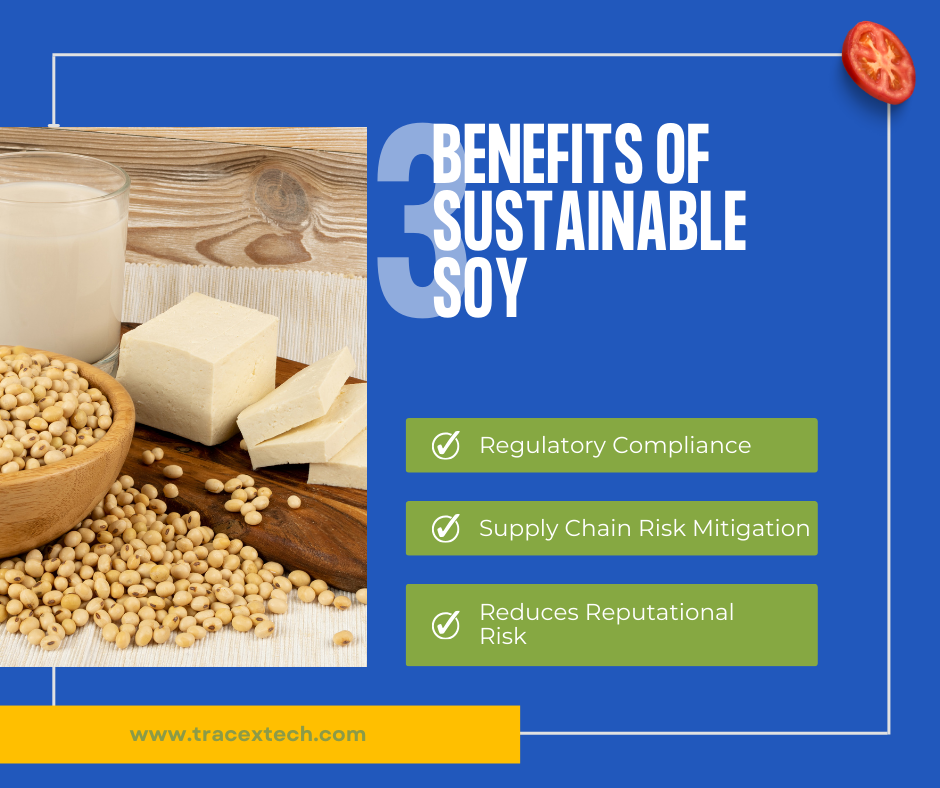Contact: +91 99725 24322 |
Menu
Menu
Quick summary: Discover the eco-friendly revolution in agriculture with our blog on Sustainable Soy Supply Chains. Dive into the intricacies of responsible sourcing, deforestation-free practices, and how innovative supply chain solutions are shaping a greener future. Explore the blog now for insights into sustainable farming, environmental impact, and the latest advancements driving positive change in the soy industry

In the contemporary landscape of global agriculture, the quest for sustainability has become paramount, and nowhere is this more evident than in the evolution of soy supply chains. Soy, a versatile and widely used commodity, plays a pivotal role in various industries, from food and animal feed to biofuels and industrial products. However, the conventional production of soy has often been associated with deforestation, habitat destruction, and social issues. Against this backdrop, the imperative for sustainable soy supply chains has gained prominence.
Soy, a sought-after commodity present in products like is notably favored by proponents of plant-based diets for its protein-rich qualities. Despite this, a significant 77% of soy production is directed toward animal feed, with poultry and pigs being the primary contributors to the surging demand for soy.
This blog aims to explore the dynamics of sustainable soy production, delving into practices that prioritize environmental conservation, ethical sourcing, and community well-being. By examining the innovations and initiatives within the soy industry, we seek to unravel the complexities of creating a more ecologically and socially responsible soy supply chain for a resilient and sustainable future.
The soybean, a globally traded and exceptionally versatile crop, stands as the world’s foremost provider of animal protein feed and the second-largest contributor to vegetable oil. Notably, soybean production is intertwined with critical challenges such as climate change and deforestation.
The rising demand for soy products has caused an expansion of soy production in forest areas, particularly in the Amazon and the Cerrado region of Brazil.
Almost a third of soybeans imported into the EU comes from Brazil, and 80 percent of soymeal comes from Brazil and Argentina.
Sustainable soy refers to soybean cultivation and trade practices that prioritize environmental, social, and economic considerations. The significance lies in mitigating deforestation, promoting biodiversity, and ensuring fair labor conditions. Sustainable soy supply chains address the environmental impact of conventional soy production, such as deforestation in the Amazon. Currently, soy supply chains face challenges like deforestation-linked controversies and social issues. Adopting sustainable practices involves sourcing soy responsibly, encouraging transparent supply chains, and supporting certifications like the Round Table on Responsible Soy. Balancing economic interests with environmental and social responsibility is crucial for the future of soy supply chains.
Round Table on Responsible Soy (RTRS), advocates sound agricultural practices in the soy industry. These practices encompass reduced-till or no-till farming, crop rotation, effective water and nutrient management, and the cultivation of cover crops. When executed appropriately, sustainable soy production places a premium on the overall health of ecosystems, enhancing crop yields while safeguarding arable land. Through the implementation of initiatives that trace the supply chain, you can monitor regenerative practices and the absence of deforestation at the farm or plantation level, offering credible data to substantiate your commitment to sustainable soy.
Certification programs and standards play a pivotal role in advancing sustainable soy practices.
Agroecological approaches promote sustainable farming by integrating ecological principles into agricultural practices. This includes crop diversification, reduced chemical inputs, and improved soil management, fostering long-term environmental health. Additionally, technology and innovation contribute significantly. Precision agriculture, data analytics, and advancements in sustainable farming technologies enhance efficiency, minimize environmental impact, and improve overall soy production sustainability.
Integrating these three pillars—certification programs, agroecological approaches, and technological innovation—provides a comprehensive framework for fostering sustainable soy farming practices on a global scale.
Sustainable soy holds paramount importance due to its multifaceted impacts.
Companies adapting to sustainable soy practices not only contribute to global conservation efforts but also align themselves with market preferences, ensuring long-term viability in an environmentally conscious consumer landscape.

Addressing these dynamics involves establishing robust certification systems, fostering industry collaboration, and promoting transparent supply chains to meet the increasing demand for environmentally and socially responsible soy products.
As European Union diligence regulations, including EUDR, ESRS, and CSRD, become more stringent, having verifiable evidence for your sustainable sourcing assertions can protect your business from potential expensive fines or shipment seizures. Ensuring auditable proof linked to responsible farming practices and traceability data associated with your product is vital to maintaining compliance within your soy supply chain.
The importance of traceability in soy supply chains lies in its ability to provide a transparent journey from farm to consumer, ensuring accountability and sustainability. Technologies enabling transparency, such as blockchain and supply chain management systems, play a pivotal role. These technologies facilitate real-time tracking of soy production, processing, and distribution, allowing stakeholders to verify the origin and sustainability of soy products. The benefits for consumers include the ability to make informed choices, supporting environmentally and socially responsible products. For businesses, traceability enhances brand reputation, meets regulatory requirements, and aligns with the increasing market demand for transparency. Overall, traceability not only ensures the integrity of soy supply chains but also fosters a more responsible and ethical marketplace.
The race to meet EUDR compliance for soy supply chains has begun.
To validate that your soy adheres to deforestation-free standards during an audit, you must present tangible proof regarding the origin of your product. This involves recording the geographical coordinates of the specific land plots on farms or plantations where your soybeans are cultivated. Utilizing techniques such as satellite imagery or publicly available cadasters allows you to confirm that the land has not been involved in deforestation. It is imperative to establish a connection between the geo-located farm or plantation and the transaction history of your soybeans from the source, maintaining this linkage throughout the entire chain of custody to ensure that your final product remains uncontaminated by non-compliant soy.
Mass balance involves the intermixing of both non-compliant and compliant commodities during production. To guarantee that your final product is entirely free from deforestation and to ensure compliance with the EUDR for access to the EU market, it is imperative that the entire batch is fully compliant, not just a portion of it. Product segregation becomes essential in this context, whereby soy from various certified sources is kept distinct and separate from regular, non-compliant soy throughout the entire production process, thus certifying the deforestation-free status of your final product.
Ensuring an audit-proof supply chain involves meticulously tracking the chain of custody for each batch, spanning from the initial plot of land through distribution and every intermediary step. Digitally recording your product’s social and environmental impact from its inception to the point of sale establishes a precise record of the individuals and factors it affects. Preserving primary source data linked to your product’s chain of custody enables you to confidently showcase its deforestation-free status at the farm or plantation level.
Traceability solutions help document and track the entire supply chain of commodities, such as soy, from the source (farms or plantations) to the final product. This comprehensive documentation is crucial for complying with EU regulations, as it allows companies to prove the deforestation-free status of their products.
Polygon mapping enables companies to capture and store the geographical coordinates of the land where soybeans are grown. This information is vital for demonstrating compliance with deforestation regulations.
Traceability solutions provide tools for monitoring the chain of custody at every stage of production. This ensures that deforestation-free soy remains segregated from non-compliant soy throughout the entire process, aligning with EU regulations that require compliance for the entire batch, not just a portion.
Digital recordkeeping facilitates accurate and secure storage of data related to the social and environmental footprint of products. This information can be crucial for audits and regulatory reporting, helping companies demonstrate adherence to EU deforestation regulations.
Traceability solutions offer real-time monitoring capabilities, allowing companies to proactively identify and address any issues that may arise in the supply chain. This proactive approach is valuable for staying ahead of compliance requirements and addressing potential risks.
In conclusion, the imperative for sustainable soy production is underscored by its far-reaching impacts on the environment, society, and market dynamics. Efforts to mitigate deforestation, address social issues, and meet the demands of conscientious consumers are pivotal. Certification programs, agroecological approaches, and technological innovations provide a comprehensive framework for fostering sustainability in soy supply chains. The integration of traceability solutions like TraceX ensures transparency, reinforcing accountability from farm to consumer. As emerging technologies reshape agriculture, and consumer preferences drive market trends, the trajectory toward sustainable soy is becoming increasingly evident. Regulatory frameworks further solidify the commitment to responsible practices. In this collective pursuit, the synergy of technology, consumer awareness, and regulatory support is shaping a more sustainable future for soy production, balancing economic viability with environmental and social responsibility.
